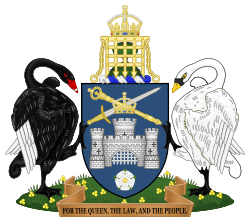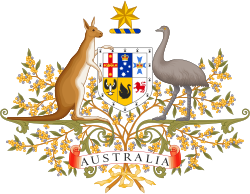Government of the Australian Capital Territory
The Government of the Australian Capital Territory, also referred to as the Australian Capital Territory Government or ACT Government, is the executive authority of the Australian Capital Territory, one of the territories of Australia. The leader of the party or coalition with the confidence of the Australian Capital Territory Legislative Assembly forms Government. Unlike the Australian States and the Northern Territory, the Australian Capital Territory Legislative Assembly directly elects one of their number to be the Chief Minister of the Australian Capital Territory as the head of the Government, rather than being appointed by a Governor or Administrator.[1]
 Logo of the Australian Capital Territory government and its directorates | |
 Coat of arms of the City of Canberra, used for formal and ceremonial purposes. | |
| Formation |
|
|---|---|
| Australian territory | Australian Capital Territory |
| Website | http://www.act.gov.au/ |
| Legislative branch | |
| Legislature | Australian Capital Territory Legislative Assembly |
| Meeting place | Australian Capital Territory Legislative Assembly, Canberra |
| Executive branch | |
| Leader | Chief Minister |
| Appointer | ACT Legislative Assembly |
| Meeting place | Australian Capital Territory Legislative Assembly, Canberra |
| Judicial branch | |
| Court | Supreme Court |
| Seat | Canberra |
Since December 2014, the Chief Minister of the Australian Capital Territory has been Andrew Barr, leader of the Labor Party. Following the 2016 ACT election the Government has been formed by a coalition of twelve Labor members and two Greens members. The terms of the coalition are outlined in the Parliamentary Agreement for the 9th Legislative Assembly for the Australian Capital Territory.[2]
Ministers are appointed by the Chief Minister.[3] The current ministry of the Australian Capital Territory (Second Barr Ministry) comprises eight of the twenty five Members of the Australian Capital Territory Legislative Assembly.[4]
Constitutional framework
The ACT has internal self-government, but Australia's Constitution does not afford the territory government the full legislative independence provided to Australian states. Government for the Australian Capital Territory is outlined in Commonwealth legislation; the Australian Capital Territory (Self-Government) Act 1988.[5] Nonetheless, the ACT is governed according to the principles of the Westminster System, a form of parliamentary government based on the model of the United Kingdom.
Legislative power rests with the unicameral Australian Capital Territory Legislative Assembly.
Executive power rests formally with the Executive, which consists of the Chief Minister and Ministers, and is informally called the Cabinet.
Judicial power is exercised by the Supreme Court of the Australian Capital Territory and a system of subordinate courts, but the High Court of Australia and other federal courts have overriding jurisdiction on matters which fall under the ambit of the Australian Constitution.
The ACT does not have a separate system of local government such as that seen in the Australian States and the Northern Territory. In the ACT, government functions that would usually be handled by local government are instead directly handled by the Territory government.
Current Ministry
The current arrangement of the incumbent ministry (Second Barr Ministry) of the ACT was appointed on 26 August 2019, comprising seven Labor Party members and one Greens member.[4]
| Portfolio | Minister | Party affiliation | Term start | Term end | Term in office | |
|---|---|---|---|---|---|---|
|
Andrew Barr MLA | Labor | 26 August 2019 | incumbent | 352 days | |
|
Yvette Berry MLA | Labor | ||||
|
Mick Gentleman MLA | Labor | ||||
|
Rachel Stephen-Smith MLA | Labor | ||||
|
Gordon Ramsay MLA | Labor | ||||
|
Chris Steel MLA | Labor | ||||
|
Shane Rattenbury MLA | Greens | ||||
|
Suzanne Orr MLA | Labor | ||||
ACT Government Directorates
The ACT Government is served by a unified ACT Public Service agency, reporting to a single Head of Service.
Administrative units, known as Directorates, are grouped under areas of portfolio responsibility. Each Directorate is led by a Director-General who reports to one or more Ministers.
As of November 2019, there are seven Directorates:[6]
- Chief Minister, Treasury and Economic Development Directorate (CMTEDD)
- Community Services Directorate
- Education Directorate
- Environment, Planning and Sustainable Development Directorate (EPSDD)
- Health Directorate
- Justice and Community Safety Directorate
- Transport Canberra and City Services Directorate (TCCS)
Public Authorities and Territory Owned Corporations
The ACT Government also has a number of Public Authorities and Territory Owned Corporations:[7]
- ACT Building & Construction Industry Training Fund Board: providing funding for the training of eligible workers in the ACT building and construction industry.
- ACT Long Service Leave Authority: administers portable long service leave schemes.
- ACT Teacher Quality Institute: an independent statutory authority established to build the professional standing of ACT teachers and to enhance the community’s confidence in the teaching profession through professional regulation and practical initiatives to raise teacher quality.
- Cultural Facilities Corporation: manages the Canberra Theatre Centre; the Canberra Museum and Gallery (CMAG).
- Icon Water Limited: providing drinking water and wastewater services to the ACT and surrounding regions.
- EvoEnergy: owns and operates the ACT electricity and gas networks as well as gas networks in Queanbeyan and Palerang shires and Nowra.
- Independent Competition and Regulatory Commission: a statutory body set up to regulate prices, access to infrastructure services and other matters in relation to regulated industries and to investigate competitive neutrality complaints and government-regulated activities. The ICRC also has responsibility for licensing utility services and ensuring compliance with licence conditions.
The following are officers of the Australian Capital Territory Legislative Assembly:
- ACT Audit Office: responsible for the audit of all ACT public sector agencies.
- ACT Electoral Commission: an independent statutory authority responsible for conducting elections and referendums for the Australian Capital Territory Legislative Assembly.
See also
References
- "Australian Capital Territory (Self-Government) Act 1988 – Sect 40".
- "Parliamentary Agreement for the 9th Legislative Assembly for the Australian Capital Territory" (PDF). Chief Minister, Treasury and Economic Development Directorate. Archived (PDF) from the original on 23 March 2018. Retrieved 6 November 2019.
- "Australian Capital Territory (Self-Government) Act 1988 – Sect 39".
- "Australian Capital Territory (Self-Government) Ministerial Appointment 2019 (No 2)" (PDF).
- "Australian Capital Territory (Self-Government) Act 1988".
- "ACT Government Directorates". ACT Government. Retrieved 6 November 2018.
- "Public Authorities and Territory Owned Corporations". ACT Government. ACT Government.
External links
- https://www.act.gov.au/ ACT Government website
- http://classic.austlii.edu.au/au/legis/cth/consol_act/acta1988482/index.html#s24/ The Self-Government Act 1988 (Cth) in AustLII
